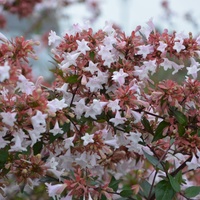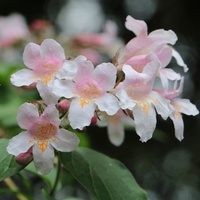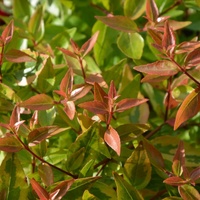Common name: Chinese abelia
Other common names: Abelia
Description
A native of southern China, this flowering shrub grows 1 to 2 m (3 to 6 ft) tall and has long cane-like branches that arch toward the ground, giving it a graceful, weeping, fountain-like shape.
The leaves are small and glossy green and remain on the plant throughout the year in a close and compact arrangement along the branches. The flowers are trumpet-shaped, white, tinted pink, and sweetly fragrant. They bloom in showy clusters on new growth from spring to summer.
Use
It is commonly cultivated as a flowering shrub or hedge, and its nectar-rich flowers attract butterflies and hummingbirds to the garden.
The long, slim, cane-like branches with compact foliage make excellent cut foliage for tall floral arrangements.
Climate
Grows and flowers reliably in moderately humid subtropical and tropical mid- to high-elevation climates, generally areas with annual lows of 10 to 18°C, annual highs of 20 to 27°C, annual rainfall of 900 to 2000 mm and a dry season of 5 months or less. It is also known to grow well in cool temperate regions and will tolerate frost.
Growing
New plants are usually grown from tip cuttings taken in the warm, humid months when the plant is actively growing.
It grows well in a wide range of free-draining, moderately acid to slightly alkaline soils, generally with a pH of 6.5 to 7.5 and on sites with full to partial sun exposure.
Problem features
No known weed risk or other problem feature is associated with growing this plant.
Where it grows
References
Books
-
Church, G. & Greenfield, P. 2002, Trees and shrubs for fragrance, David Bateman, Auckland, New Zealand
-
Macmillan, H. F. 1943, Tropical planting and gardening : with special reference to Ceylon, 5th ed, Macmillan Publishing, London
-
Oakman, H. 1981, Tropical and subtropical gardening, 2nd ed., Jacaranda Wiley Publications, Milton, Queensland
-
Oakman, H. 1995, Harry Oakman's what flowers when : the complete guide to flowering times in tropical and subtropical gardens, University of Queensland Press, St. Lucia, Queensland
-
Randall, R. P. 2007, The introduced flora of Australia and its weed status, Cooperative Research Centre for Australian Weed Management, Glen Osmond, South Australia




